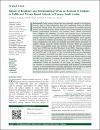Impact of resilience and environmental stress on burnout of students in public and private dental schools in Western Saudi Arabia.
| Author | Alsharif, M |
| Author | Almadani, N |
| Author | Mahmoud, R Y |
| Author | Alsharif, A |
| Author | Al-Maweri, S A |
| Author | Kassim, S |
| Available date | 2023-03-08T04:38:41Z |
| Publication Date | 2023-02-01 |
| Publication Name | Nigerian Journal of Clinical Practice |
| Identifier | http://dx.doi.org/10.4103/njcp.njcp_35_22 |
| Citation | Alsharif, M; Almadani, N1; Mahmoud, RY1; Alsharif, A2; Al-Maweri, SA3; Kassim, S2,. Impact of Resilience and Environmental Stress on Burnout of Students in Public and Private Dental Schools in Western Saudi Arabia. Nigerian Journal of Clinical Practice 26(2):p 162-168, February 2023. | DOI: 10.4103/njcp.njcp_35_22 |
| ISSN | 1119-3077 |
| Abstract | Dental students' burnout has been repeatedly reported in the literature; however, there is little information about the contributing factors in different contexts and settings. This study aimed to investigate the correlation between burnout among undergraduate dental students and sociodemographic (specifically gender), psychological (resilience), and structural factors (dental environment stress). An online cross-sectional survey questionnaire was distributed among a convenience sample of 500 undergraduate Saudi dental students. The survey included questions about sociodemographic factors (gender, level of education, academic achievement, type of school [public or private], and living arrangements). The study also included items that allowed assessment of students' burnout using the Maslach Burnout Inventory (MBI) and assessment of student environmental stress and resilience using the Dental Environment Stress Scale (DESS) and the Brief Resilience Scale (BRS). Descriptive statistics, univariate, and linear regression analyses were performed. The response rate was 67% (male = 119, female = 216). Univariable analysis showed that gender, level of education, and DESS and BRS scores correlated significantly (P <.05) with MBI scores. Adjusted multiple linear regression lends further support to that the MBI scores negatively correlated with the BRS score but positively correlated with the DESS score (β = -0.29, P <.001; β = 0.44, P <.001, respectively). Within the limitations of this study, the findings demonstrated that increases in resilience correlated significantly with decreases in burnout and increases in environmental stress correlated significantly with increases in burnout among dental students. However, gender had no influence on burnout. |
| Language | en |
| Publisher | Medknow Publications |
| Subject | Burnout dental students gender resilience stress |
| Type | Article |
| Pagination | 162-168 |
| Issue Number | 2 |
| Volume Number | 26 |
| ESSN | 2229-7731 |
Files in this item
This item appears in the following Collection(s)
-
Dental Medicine Research [436 items ]


